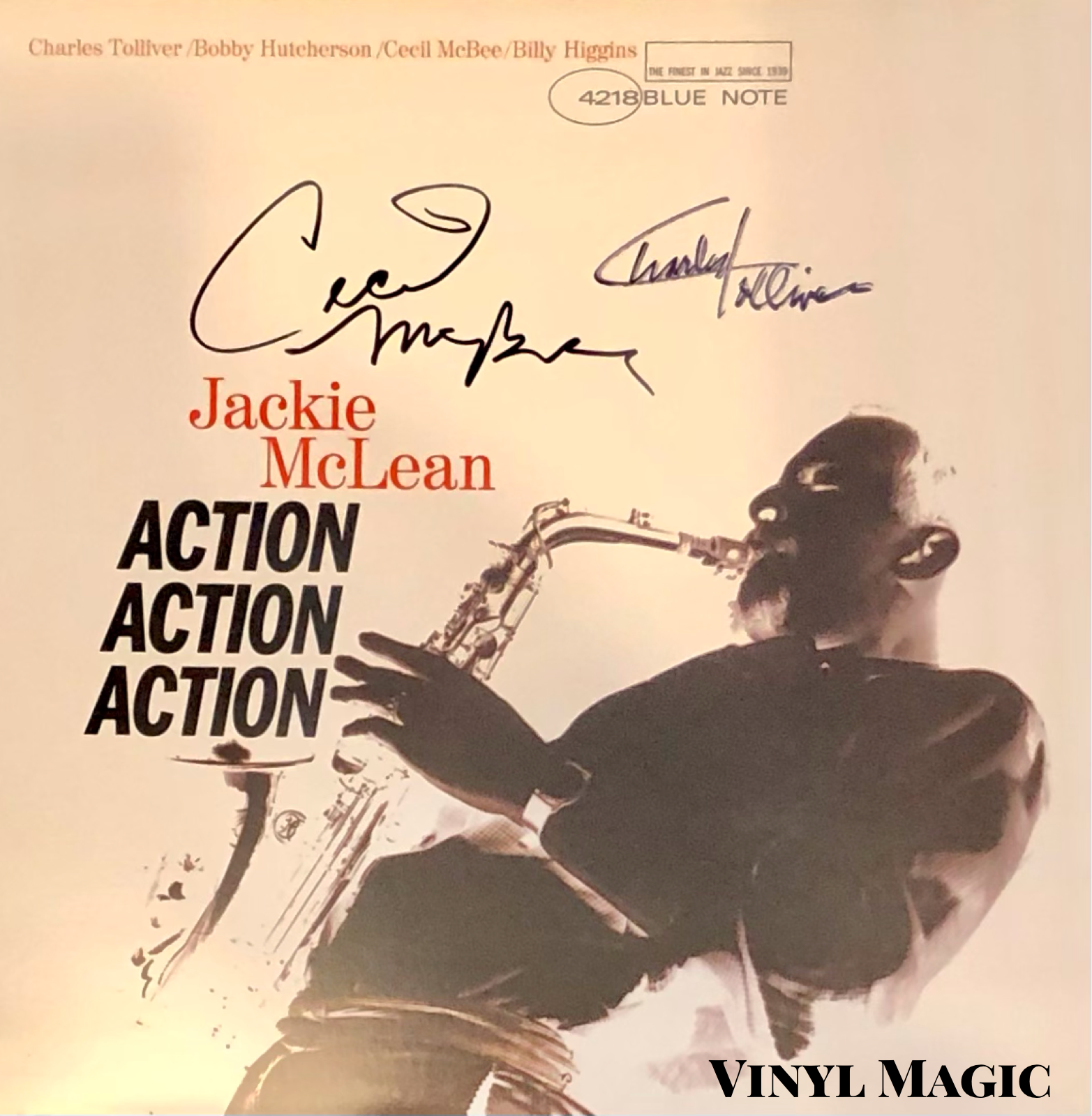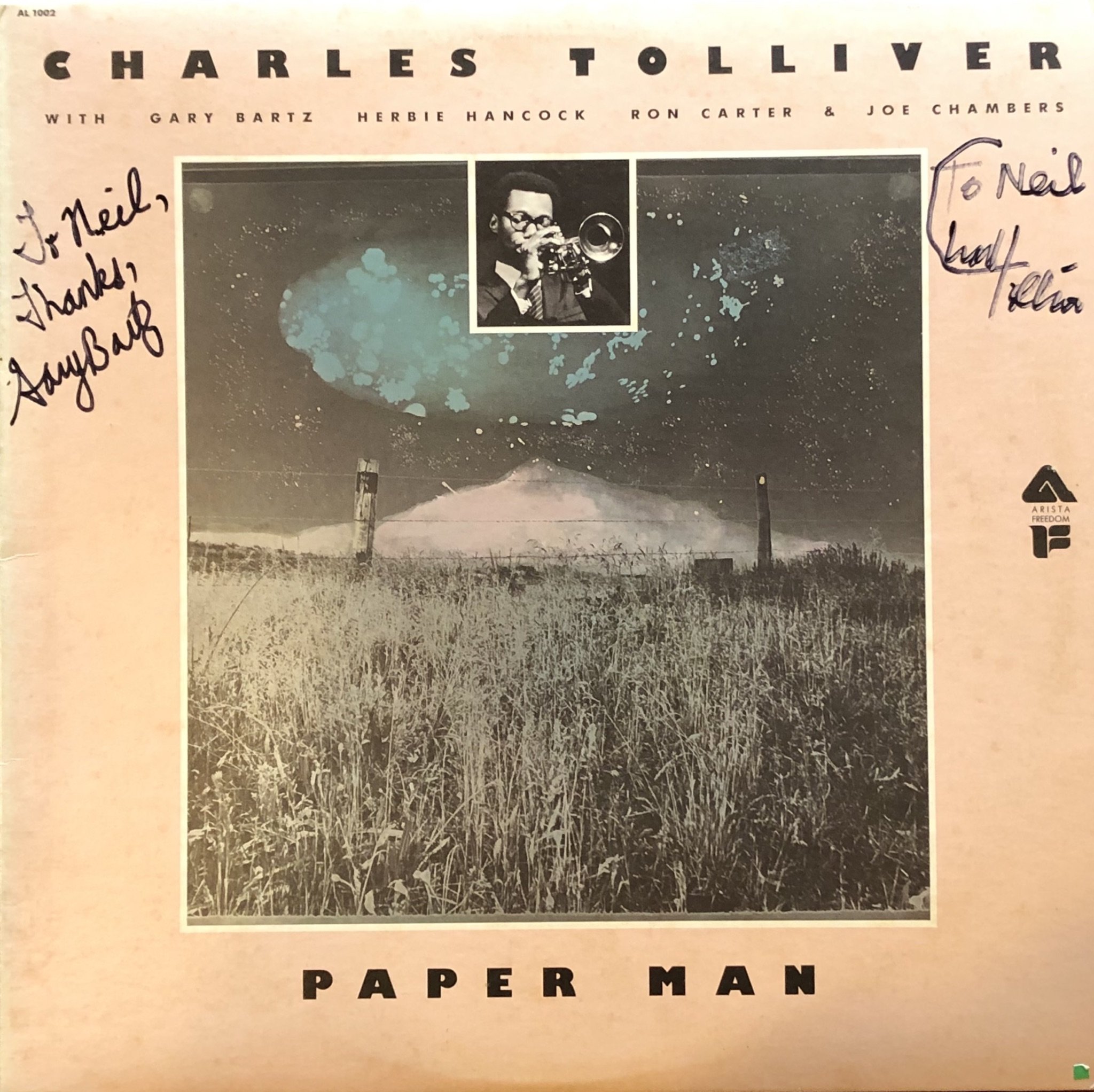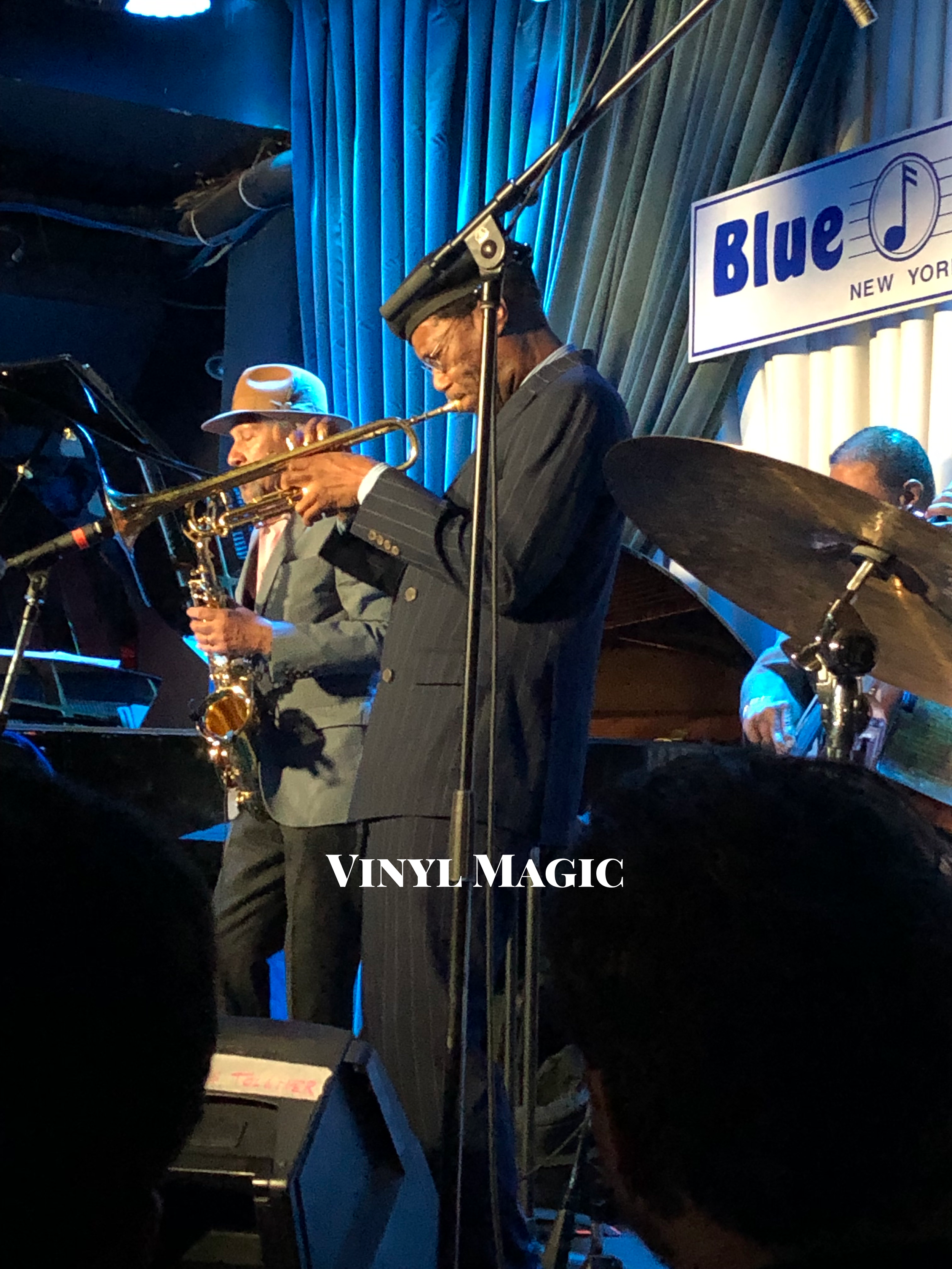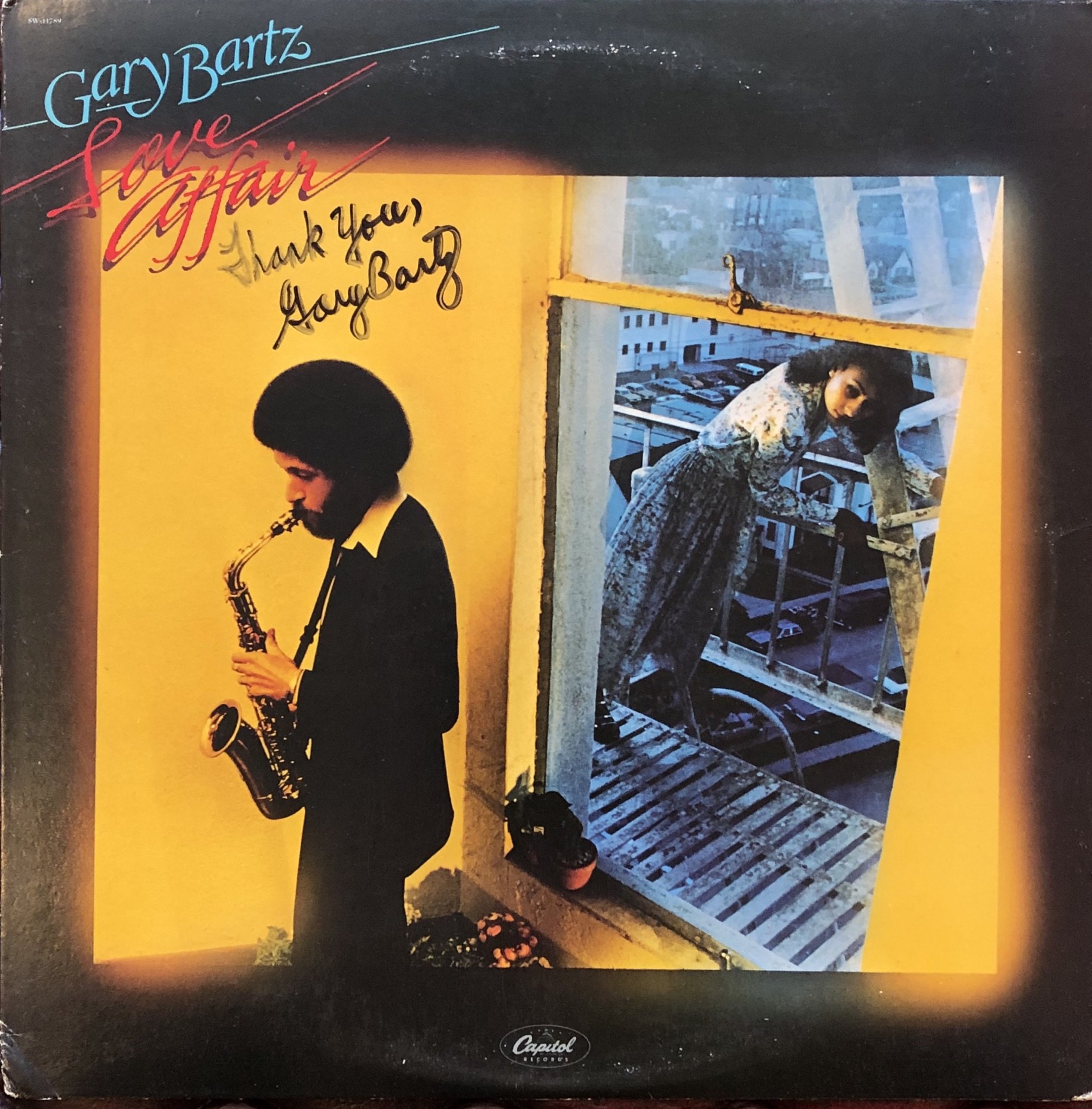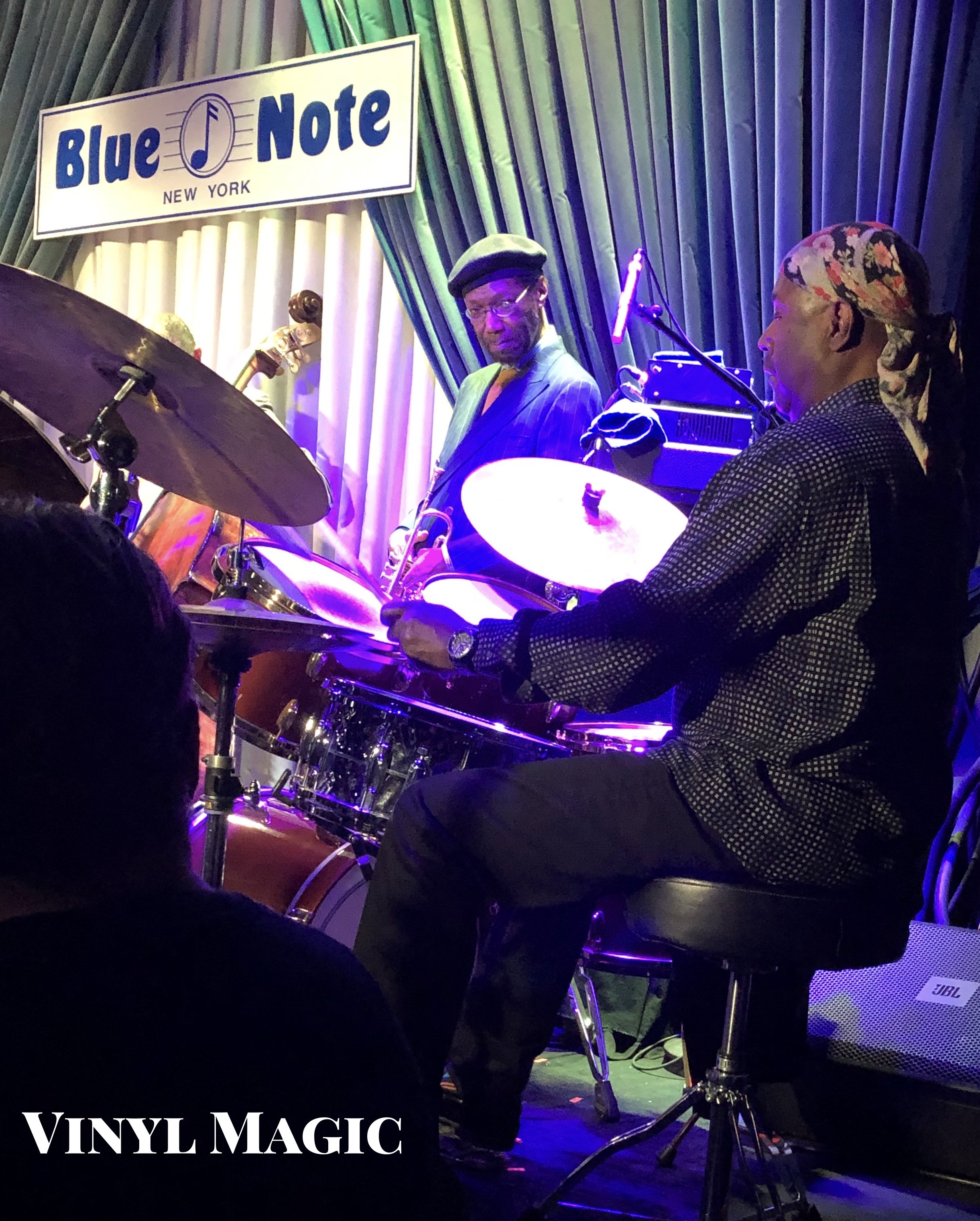Charles Tolliver, Gary Bartz and Me…
I take the most difficult path for improvisation, because it’s easy to actually play a number of choruses and never make a mistake, never break down. You just play them effortlessly. That’s no fun. You need to get in hot water by trying something out right from the jump, get yourself out of that, and move on to the next chorus. I rumble. I like the rumble.
Charles Tolliver
Jazz is about improvisation and changing things around, to fit the mindset of the men on the bandstand. Say the soloist is gathering steam or the drummer moves the soloist to another gear. I then have the liberty to move things around; by eye contact or a hand movement, they know immediately that I want to take a section or part of a section and put it somewhere else. It takes some time playing together to do that, but it means that each night the guys are refreshed, and not just reading the stuff the same way all the time.
Charles Tolliver
Action Action Action (1964) signed by Charles Tolliver, Cecil McBee
I noticed the rhythms of the church and the communal thing that happens between the parishioners and the pastors - especially in the Holiness Church, where my grandmother was. They'd get up and have the call-and-response with each other, and some of them would actually fall out and froth at the mouth, like the Haitian voodoo business. Other parts of the family were in other denominations, but it was communal, and the music came out of the old hymn books by James Weldon Johnson and others from the 19th century. There were all different types of rhythms in it. So early on, it was apparent to me that rhythm, as personified in the modern drum kit, is integral for this kind of music. I require the drummer to really lay it on. A lot of my compositions and arrangements sound as if I wrote them for the drums, and in my playing, I work off the rhythm a lot. More so, let's say, than playing linearly.Charles Tolliver
The Ringer (1969 recordings, 1975 release) signed by Charles Tolliver
Charles Tolliver is a noted trumpeter, composer, arranger, and conductor. As if that wasn't enough, Charles also found the time to start a highly acclaimed record label, Strata East, in 1971 with his colleague, the esteemed jazz pianist Stanley Cowell. Founded by artists for artists, it was an extraordinary concept at the time, and not without attendant controversy. As Charles recently recalled, "I'm a believer in ownership of your intellectual property or art form. It has nothing to do with politics. A lot of people have tried to read the political and racial overtones into the creation of Strata East Records. It had absolutely nothing to do with that. It had to do with ownership... The label was never created to put artists under a contract...it was created as a conduit for artists to get their product to the marketplace, pure and simple." Important artists Gil Scott-Heron, Pharoah Sanders, John Hicks and many others including Charles and Stanley Cowell have released influential recordings under the Strata East imprimatur. Though a somewhat revolutionary approach in 1971, the trailblazing efforts of Charles and Strata East Records has led other artists and collectives to form their own labels and pursue their independent artistic endeavors.
Born in Jacksonville, Florida in 1942, the Tolliver family moved to Harlem in New York City in 1952 and there, Charles has resided ever since (save for a four year stint in Washington, DC when he was a Pharmacy major at Howard University). Even while in DC, Charles felt, "I was always returning home, " and so he did, hooking up with Jackie McLean in New York City and recording three acclaimed Blue Note Records (1964-1966), before hitting the road with Gerald Wilson's scorching big band, and then settling down leading his own bands and performing his own compositions.
I saw Charles recently at the Blue Note in New York City where he was celebrating the 50th anniversary of the release of Paper Man, a celebrated album which featured the singular talents of Charles on trumpet, Gary Bartz on alto saxophone, Herbie Hancock on piano, Ron Carter on bass, and Joe Chambers on drums. To be sure, it was an estimable band of all stars. For this performance, Gary Bartz reprised his role on a searing alto, Vijay Iyer had the unenviable task of filling in for Herbie Hancock on piano, Buster Williams supplied a bed rock bass, and Lenny White drove the bus with his syncopated drums.
Expansions (1968) signed by Gary Bartz, McCoy Tyner
The band ascended the small stage to a raucous, sold out Sunday night crowd anticipating a fiery show. We would not be disappointed. Bespectacled and resplendent in a blue double breasted pin-striped suit, black beret rakishly askew, Charles had the manner and mien of an English Literature professor, or perhaps, a purveyor of rare books and manuscripts. That illusion disappeared quickly as Charles counted off the first tune tapping his right foot, and then it was off to the races with a screaming hard bop "Household Of Saud." The two pronged attack of Bartz and Tolliver in a frenzy, each player frenetic and furiously out-blowing the other. "Lil's Paradise" followed with a long solo by pianist Vijay Iyer who displayed his lyrical touch. The youngest on the band stand by more than twenty years, Vijay is no less gifted. A MacArthur Fellow recipient in 2013, when he is not touring or recording, Vijay teaches at Harvard, after studying at Yale and getting his doctorate at University of California, Berkeley.
Blue Note, NYC 3/17/2019: Vijay Iyer on piano, Gary Bartz, Charles Tolliver, Buster Williams on bass
There was funky filth in the third song "Right Now" which showcased a mesmerizing alto solo by a slouched Gary Bartz along with the crisp back beat furnished by the propulsive Lenny White. Big smiles and knowing glances abounded after each solo, old masters pushing each other and enjoying the results. The fire and the fury was also revealed in the drum solo by Lenny White, arms akimbo, at times sensitive and nurturing, other times flailing, hitting snares and cymbals with a precision and force that went right through my spine, and made me sit up straight in my chair. Attention was paid. The fourth song - and all of the program's selections were from Paper Man - was "Peace With Myself." A ballad with a florid, lyrical piano intro, then Charles joined on mute, while Gary took us on a meandering and exploratory alto solo. Underneath, Lenny and Buster provided a rococo Latin beat. The final song - "Repetition" - was originally recorded for the 1968 session but was left off for time constraints, It has subsequently been released on CD. Written by Neal Hefti in 1950 for the seminal recording Charlie Parker with Strings, it was in keeping with the band's approach: a frantic, full throttled attack by Bartz and Tolliver. Unlike most of Hefti's work, which included writing the bluesy Count Basie standards "Lil' Darlin'", "Cute", and "Splanky", in Bartz and Tolliver's skilled hands, it was a hard bop tour de force. As Charles remarked once about his influences, "It comes from the style of jazz which we played, which is high energy music. As a young child, I listened to Charlie Parker, Thelonious Monk, Dizzy Gillespie, Kenny Clarke and Max (Roach), and they were on all cylinders all the time. It's in my blood." High energy indeed, that was certainly the performance that I had just witnessed!
Gary Bartz blowing sweet!
Now it was time for a visit with Charles and Gary who were sharing a dressing room upstairs. I knocked gently on the door and was escorted in. I approached Gary first as Charles was noshing on a salad quietly in a corner, while friends were seated, scattered on couches and chairs. Gary was warm and effusive. "Hey, let's see what you got," he greeted me. I handed him Paper Man. "Ooh, that's a great album. What's your name?" 'Neil, N-e-i-l,' I said slowly. "Oh, I see you spell it wrong," Gary teased. 'Yeah, well fuck Neal Hefti, he spells it wrong," i countered, brimming with confidence. The whole room laughed and I handed Gary some other vinyl. When he saw McCoy Tyner's Expansions, he said, "This is a great album but this isn't the original cover. This is a reissue." Amen brother Gary, spoken like a true vinylphile.
Ellington Is Forever, Volume Two (1975) signed by Gary Bartz, Kenny Burrell, Ernie Andrews, Sir Roland Hanna, Joe Henderson
Gary was particularly interested in Kenny Burrell's Ellington Is Forever, a jam session not only remarkable for its roster of all stars - Nat Adderley, Joe Henderson, Jimmy Smith - it also features the last recordings of Quentin "Butter' Jackson, a long time Ellington trombonist, who died before it was released. "I know (drummer) Philly Joe (Jones) is on this album," Gary said as he opened the gatefold, scouring the pictures of his friends and colleagues from the long ago 1975 sessions. "Yes, there he is, and there's "Butter", too." Quentin "Butter" Jackson played with the most significant big bands during his lengthy career, from Cab Calloway to Duke Ellington, Count Basie to Quincy Jones... "Butter" said it best about all things Ellingtonia: "You just can't describe Duke's music, because the music itself is so descriptive. So much fire, so much to say. Every piece describes some part of life, or some person, or even a color... once you're in Duke's band, you never get out. It's part of you forever."
Love Affair (1978) signed by Gary Bartz
Gary laughed when he saw Love Affair, a 1978 recording. "They gave me a budget for this one. Do you remember those days?!" he said as he held it up to Charles. 'How much?' i queried. "$90,000, and of course I went over by $20,000. Man, those strings were expensive," he confided, thereby dispelling any notion that there were nefarious activities involved. "Check out my hair on this one. I wasn't wearing any hats then, my afro was fully formed!" he said with a chuckle. I thanked Gary for his time and, especially, the music.
Now, it was time to "harass" Charles. "Let me see Paper Man, and I already know how to spell your name: k-n-e-e-l, right?!" he said grinning while the room erupted in laughter. "Well, what else?" I handed him Jackie McLean's Action, a steaming hard bop 1964 Blue Note recording which featured two Tolliver compositions of the five selections on the record. "Jackie means so much to me. I wouldn't be here today if it weren't for him." 'How did he find you?' I asked. "Find Me? I found him. When I first came to New York, I sought him out. He gave me a chance when he let me sit in with him at Slugs, and we made some great music together. He was a beautiful man."
Virgo Vibes (1967) signed by Charles Tolliver, Roy Ayers, Buster Williams, Reggie Workman
Next came two sides with vibraphonist Roy Ayers - Virgo Vibes and Stoned Soul Picnic. "These are great albums and Roy is such a beautiful man, what a talented player," Charles added. I noted that Herbie Mann produced both albums and appears on the cover of Stoned Soul Picnic despite not playing on either record. "Herbie had nothing to do with the music on these albums. That was all Roy and the rest of us," Charles stated firmly. Indeed, Charles was responsible for all the taut arrangements on Stoned Soul Picnic as well as some crisp trumpet on both sessions.
Stoned Soul Picnic (1968) signed by Gary Bartz, Charles Tolliver, Roy Ayers
Finally, I handed Charles Live And Swinging, a tour de force from Gerald Wilson's big band. "Oh my, Gerald was such an important figure in my life. The reason I dress like I do today comes directly from him." Charles explained, "You know when I started with Gerald, I didn't have much and his band were all sharp dressers. Gerald came to me, he had a very elegant way of speaking, and he said, 'Now Charles, I know you really don't have suitable clothes for our bandstand so I would like to send you to my tailor who will make you some suits. My tailor is Hart Schaffner Marx. Please go see them and they will take care of you.' I was thrilled, I had no idea who Hart Shaffner Marx was, but I went and I had four suits made. I wore them for the next four years, even as I began to outgrow them," Charles laughed. "It was later that I found out that Hart Schaffner Marx was a sponsor of Gerald's band and all the cats had similar suits." How about Gerald's charts? I probed. "Oh man, I learned so much from him. He was an incredible writer, simply the best charts and arrangements."
Live And Swinging (1967 signed by Charles Tolliver, Gerald Wilson
I thanked Charles again for his generosity and the wonderful music and I told him that the band sounded great, augmented by his gifted rhythm section, Buster Williams on bass, Lenny White on drums, and Vijay Iyer on piano. "Thank you, Neil. It's a million dollar band. A million fucking dollar band," Charles stated emphatically. 'Can I quote you?' "Musically? Yes, absolutely."
Truth, words and respect from a towering musician of impeccable taste, influence, and talent.
Choice Charles Tolliver Cuts (per BKs request)
https://www.youtube.com/watch?v=u_2OgAqomxM
"Paper Man" Paper Man 1968
https://www.youtube.com/watch?v=CoYa7O4zBzk
"Paper Man" Live And Swinging with Gerald Wilson 1967
https://www.youtube.com/watch?v=2_RKvp1hON0
"Lil's Paradise" Paper Man 1968
https://www.youtube.com/watch?v=c7raIuNiWig
"Household Of Saud" Paper Man 1968
https://www.youtube.com/watch?v=OCcAsYW4fxg&list=PLlxdnGV3wLNMeEBb7ixlMrepULo_pDr-u
"Earl's World" New Tolliver 1978
https://www.youtube.com/watch?v=P2nW1P_njos&list=PLlxdnGV3wLNMeEBb7ixlMrepULo_pDr-u&index=7
" 'Round Midnight" Charles Tolliver Big Band With Love 1978
https://www.youtube.com/watch?v=cCevx5odvRI
"Plight" Action with Jackie McLean 1964
https://www.youtube.com/watch?v=xl4FNUWrJLE
"Wave" Stoned Soul Picnic with Roy Ayers 1968
Lenny White under the watchful eye of Charles, always give the drummer some!
